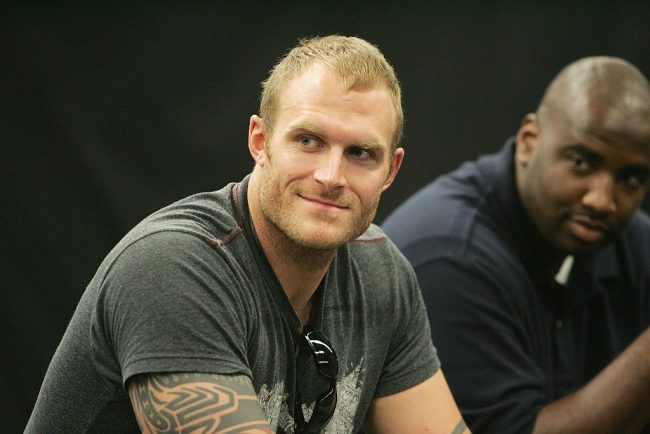HOUSTON – Kyle Turley will gladly run down the list of chronic ailments he has because of football.

Might want to grab a seat.
This is gonna take a while.
“I’ve got a plate and 10 screws in my right ankle. I’ve got two broken toes on my left foot. I need two new knees from other surgeries as well. I need a new back surgery and fusion. I’ve got bone on bone in my shoulders, and my neck’s giving out. I just got diagnosed with Alzheimer’s disease. All kinds of fun stuff,” said Turley, a two-time Pro Bowler who spent a decade in the NFL.
READ MORE: Can cousin of marijuana plant ease NFL’s concussion problem?
Now, he has something else.
Hope.
All because of marijuana.
While America was prepping its grills and ovens for Sunday’s national holiday known as the Super Bowl, Turley and a small group of former players were in Houston this week stirring their own pot.
WATCH: Super Bowl weekend

“Cannabis saved my life,” the 41-year-old Turley said. “I believe cannabis can save football.”
They want the NFL to drop marijuana from its listed of banned substances, a step that is long overdue to keep players from being needlessly fined and suspended for a recreational pursuit that is certainly no more dangerous than drinking alcohol.
Even more important, they’re pushing the league to really get serious about allowing cannabis-based treatments to help players cope with all their aches – especially if it keeps them away from the scourge of powerfully addictive opioids, a far more troubling issue that results in tens of thousands of overdose deaths each year, including Prince, the artist who performed the greatest Super Bowl halftime show of them all.
For those who want to turn this into a Spicoli joke, stop right there. This could be a landmark advancement for a sport that, by its very nature, condemns players to a lifetime of pain.
READ MORE: Insurer must cover NS man’s medical marijuana: human rights board
“If you’re going to play to the type of level that it takes to get to the NFL, you’re going to experience a lot of pain, a lot of injuries, a lot of trips to the hospital, a lot of surgery,” said Eben Britton, who played six years in the NFL and has long relied on marijuana to deal with the effects. “To deal with that, you take anything you can.”
Given what the NFL has been through with concussions and that it is currently facing with a proposed class-action lawsuit by former players who claim they were encouraged by their teams to abuse painkillers without any regard for their long-term health, cannabis should be at the forefront of any medical research.
“Why are we in this situation where, in our culture, it’s acceptable to take something made in a laboratory, that’s chemically processed, and creates all these issues?” Britton asked. “We understand what the opiate epidemic is doing in this country. We understand that people are dying taking prescribed doses of opiates and the abuse that comes with that. We understand that cannabis has negative side effects.”
READ MORE: Why Donald Trump could be the Canadian marijuana industry’s secret weapon
As might be expected, considering how long the NFL tried to keep its head in the sand over the devastating impact of head injuries, Commissioner Roger Goodell completely dodged the issue of marijuana during his annual state-of-the-league news conference.
Instead, he presented his own set of alternative facts, saying this was a matter to be addressed in collective bargaining rather than something far more important.
The players union is looking into the issue, but needs to move with a lot more haste. This would be a good time to show it’s not merely a puppet organization that rubber stamps everything the league wants as long as enough money is spread around.
Don’t hold your breath.
“Are there legitimate medical uses? Under what circumstances could they be used? And what circumstances may it make sense that this union would support a therapeutic use exemption?” said DeMaurice Smith, executive director of the NFL Players Association, without saying much of anything.
READ MORE: Nine questions Parliament will have to answer before we legalize marijuana
“We’re not there yet.”
Really, it’s the players themselves who need to step up.
So far, only a few have spoken out on the issue. Tennessee Titans linebacker Derrick Morgan and former Ravens offensive lineman Eugene Monroe, who retired last summer, have both called on the NFL to give a serious look at the potential health benefits of marijuana.
At the Super Bowl this week, Atlanta Falcons defensive end Dwight Freeney was asked for his thoughts on marijuana. While he didn’t give pot a full endorsement, he quickly alluded to more than half the states approving it for medical use.
“I do know that it does help people deal with pain,” Freeney said. “If the world’s doing it, and it’s not performance-enhancing, why not try to do something like that if a doctor prescribes it as something that can help you and heal you?”
READ MORE: Toronto Maple Leafs seek trademark challenge against Snoop Dogg pot logo
Of course, the federal government has shown no willingness to back off its war on drugs – pot included – and the new administration has already given off troubling signs about where it will stand on this issue.
Jeff Sessions, the nominees to the top law enforcement post in the land, said within the past year that “good people don’t smoke marijuana” and that it was a “very real danger.”
Tell that to people such as Turley and Britton.
They just want a chance to live a better life.
The NFL owes that to all its players.



Comments